The views expressed in our content reflect individual perspectives and do not represent the authoritative views of the Baha'i Faith.
Cultural appropriation—the adoption of elements of one culture by another—has robbed many Indigenous cultures of their native intellectual and religious traditions.
By appropriating those traditions, socially or economically dominant groups can practice a destructive kind of cultural colonialism.
When a dominant culture copies and misappropriates cultural elements from an Indigenous culture, and uses these symbols and practices outside of their original cultural context, it can distort, disrespect, harm, trivialize or even contribute to the destruction of the original traditions.
In our continuing series on Indigenous messengers of God, Christopher Buck and Kevin Locke tackle this important subject.
Q: Kevin, what prevents Baha’i respect for and belief in the various Indigenous messengers of God from becoming “cultural appropriation”?
A: This excerpt from “The Prosperity of Humankind,” an official statement written in 1995 by the Baha’i International Community, offers foundational guidance on the subject:
The principle of collective trusteeship creates also the right of every person to expect that those cultural conditions essential to his or her identity enjoy the protection of national and international law. Much like the role played by the gene pool in the biological life of humankind and its environment, the immense wealth of cultural diversity achieved over thousands of years is vital to the social and economic development of a human race experiencing its collective coming-of-age. It represents a heritage that must be permitted to bear its fruit in a global civilization. On the one hand, cultural expressions need to be protected from suffocation by the materialistic influences currently holding sway. On the other, cultures must be enabled to interact with one another in ever-changing patterns of civilization, free of manipulation for partisan political ends. – “The Prosperity of Humankind,” Baha’i International Community Office of Public Information, Haifa
Q: Interesting and enlightening! With such a ready answer, Kevin, I see that you’ve given this much thought—long before I ever asked you the question!
This statement sets forth protection of cultural diversity and the right to cultural identity as closely-linked Baha’i principles. On the other hand, it compares cultural diversity to “… the gene pool in the biological life of humankind and its environment,” such that “… cultures must be enabled to interact with one another in ever-changing patterns of civilization.”
So, taking the analogy to genetics and evolution a bit further, it would seem that Indigenous spiritual heritages are entitled to protection, so that they can survive and flourish. That said, there’s nothing wrong with non-Indigenous peoples being given knowledge of the sacred Indigenous traditions, especially if based on authentic sources and if presented with accuracy and respect. Do you agree?
A: This is such a fascinating topic! As you know, the United States is still very much entrenched in the consequences of centuries of active genocidal extermination and repression of everything Indigenous to this hemisphere. The analogy between biodiversity and cultural diversity is perfect, because both are critically endangered. Catastrophic climate change and the immanent extinction of a million species are emblazoned every day by headline news.
But the headlines are silent—oblivious, in fact—to the ongoing threat to Indigenous cultural diversity and survival. So the analogy in the above quote between cultural diversity and biodiversity is most appropriate. The threat to both is the result of material civilization run amok. Both biodiversity and cultural diversity must be protected by national and international law. Both are vital to the present and future needs of the human race. Both need protection from the materialistic influences currently holding sway in the world. While awareness of the cataclysmic consequences of climate change and annihilation of biodiversity is slowly entering into people’s consciousness, destruction of the cultural eco-system hasn’t yet registered on the general public’s radar.
Q: So the Baha’i International Community—which issues its public statements with the approval of the Universal House of Justice, the democratically-elected international Baha’i Council—in stating that “cultures must be enabled to interact with one another,” appears to say that intercultural knowledge and respect can and should be a positive interaction, especially when such cultural knowledge has already been publicly shared and published by respected members of an indigenous culture, when, in the act of doing so, implicitly grants an advance “permission” to discuss this same information, especially for promoting intercultural respect and reciprocity.
A: Here’s my definition of cultural appropriation: “the unacknowledged or inappropriate adoption of the customs, practices, ideas, etc. of one people or society by members of another and typically more dominant people or society.”
As you can see, this term reflects a detrimental, outworn social paradigm that casts us all into debilitating roles of the following dysfunctional, destructive dichotomies: dominant vs. marginalized, oppressor vs. oppressed, enslaver vs. enslaved, conqueror vs. conquered, exploiter vs. exploited, etc., ad nauseam. Our respective ancestors played out these opposing roles in a horrific drama whereby the Euro-Americans fought to gain control and ascendancy over the planet’s limited physical resources. We have rehearsed these roles inter-generationally and continue to be shackled by them. We are all victims in those roles. We need to move past them.
On this historic stage, we can all become heroes, regardless of our cultures. This spiritual field of action has nothing to do with material gain or ascendancy. Instead, the prize is the redemption of the collective heart of humanity in furtherance of the will of God for this day and age.
In other words, the time has come for humanity to realize and embody the Baha’i ideal of unity in diversity. Far more than an abstract ideal, the Baha’i teachings say that unity in diversity acts as a measure of our collective quality of life in societies around the world:
Please God, that we avoid the land of denial, and advance into the ocean of acceptance, so that we may perceive, with an eye purged from all conflicting elements, the worlds of unity and diversity, of variation and oneness, of limitation and detachment, and wing our flight unto the highest and innermost sanctuary of the inner meaning of the Word of God. – Baha’u’llah, The Book of Certitude, p. 160.
In reality all are members of one human family—children of one Heavenly Father. Humanity may be likened unto the vari-colored flowers of one garden. There is unity in diversity. Each sets off and enhances the other’s beauty. – Abdu’l-Baha, Divine Philosophy, pp. 25-26.


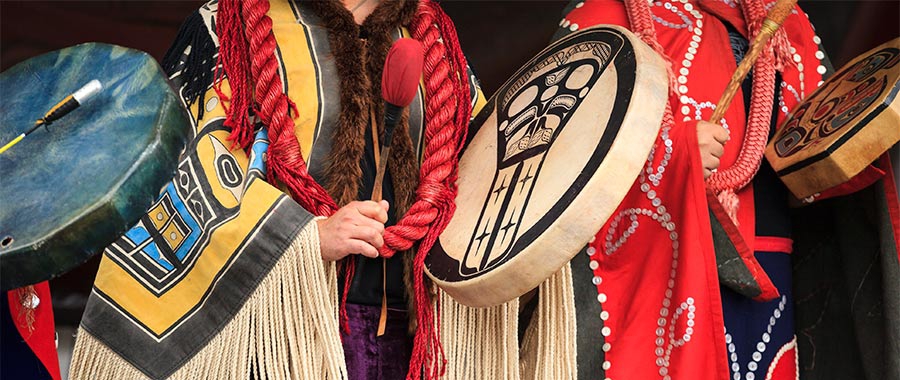
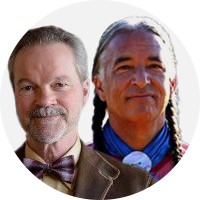
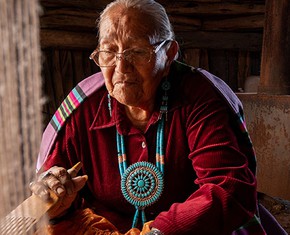
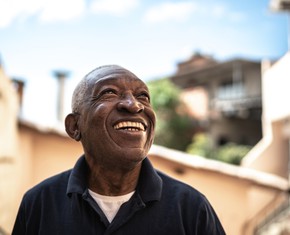

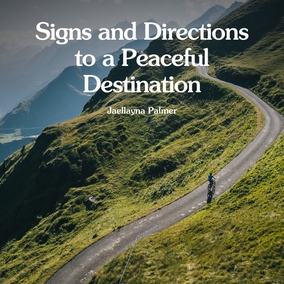
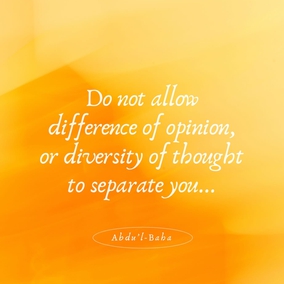
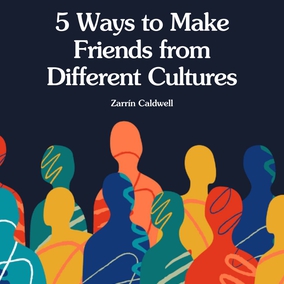
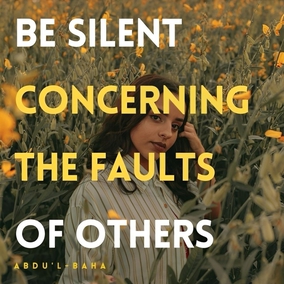





Comments
Sign in or create an account
Continue with Googleor